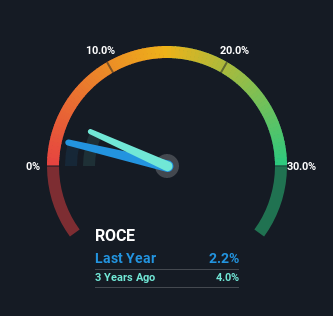- Israel
- /
- Hospitality
- /
- TASE:FTAL
Returns On Capital Signal Tricky Times Ahead For Fattal Holdings (1998) (TLV:FTAL)
If we want to find a stock that could multiply over the long term, what are the underlying trends we should look for? Amongst other things, we'll want to see two things; firstly, a growing return on capital employed (ROCE) and secondly, an expansion in the company's amount of capital employed. This shows us that it's a compounding machine, able to continually reinvest its earnings back into the business and generate higher returns. However, after investigating Fattal Holdings (1998) (TLV:FTAL), we don't think it's current trends fit the mold of a multi-bagger.
Return On Capital Employed (ROCE): What Is It?
Just to clarify if you're unsure, ROCE is a metric for evaluating how much pre-tax income (in percentage terms) a company earns on the capital invested in its business. The formula for this calculation on Fattal Holdings (1998) is:
Return on Capital Employed = Earnings Before Interest and Tax (EBIT) ÷ (Total Assets - Current Liabilities)
0.022 = ₪420m ÷ (₪21b - ₪2.2b) (Based on the trailing twelve months to March 2022).
Thus, Fattal Holdings (1998) has an ROCE of 2.2%. In absolute terms, that's a low return and it also under-performs the Hospitality industry average of 4.7%.
Check out our latest analysis for Fattal Holdings (1998)

Historical performance is a great place to start when researching a stock so above you can see the gauge for Fattal Holdings (1998)'s ROCE against it's prior returns. If you're interested in investigating Fattal Holdings (1998)'s past further, check out this free graph of past earnings, revenue and cash flow.
The Trend Of ROCE
On the surface, the trend of ROCE at Fattal Holdings (1998) doesn't inspire confidence. To be more specific, ROCE has fallen from 6.4% over the last five years. Although, given both revenue and the amount of assets employed in the business have increased, it could suggest the company is investing in growth, and the extra capital has led to a short-term reduction in ROCE. And if the increased capital generates additional returns, the business, and thus shareholders, will benefit in the long run.
The Bottom Line On Fattal Holdings (1998)'s ROCE
While returns have fallen for Fattal Holdings (1998) in recent times, we're encouraged to see that sales are growing and that the business is reinvesting in its operations. However, total returns to shareholders over the last three years have been flat, which could indicate these growth trends potentially aren't accounted for yet by investors. So we think it'd be worthwhile to look further into this stock given the trends look encouraging.
On a final note, we've found 1 warning sign for Fattal Holdings (1998) that we think you should be aware of.
For those who like to invest in solid companies, check out this free list of companies with solid balance sheets and high returns on equity.
New: AI Stock Screener & Alerts
Our new AI Stock Screener scans the market every day to uncover opportunities.
• Dividend Powerhouses (3%+ Yield)
• Undervalued Small Caps with Insider Buying
• High growth Tech and AI Companies
Or build your own from over 50 metrics.
Have feedback on this article? Concerned about the content? Get in touch with us directly. Alternatively, email editorial-team (at) simplywallst.com.
This article by Simply Wall St is general in nature. We provide commentary based on historical data and analyst forecasts only using an unbiased methodology and our articles are not intended to be financial advice. It does not constitute a recommendation to buy or sell any stock, and does not take account of your objectives, or your financial situation. We aim to bring you long-term focused analysis driven by fundamental data. Note that our analysis may not factor in the latest price-sensitive company announcements or qualitative material. Simply Wall St has no position in any stocks mentioned.
About TASE:FTAL
Fattal Holdings (1998)
Owns and operates hotels in Israel and internationally.
Proven track record with very low risk.
Market Insights
Community Narratives



